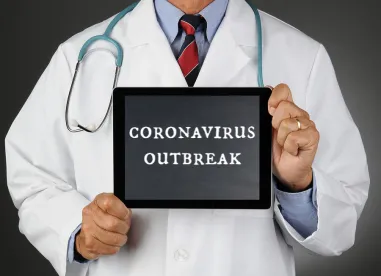Governor Lamont issued two new executive orders designed to expand the health care workforce, immunize providers from COVID-19-related liability, and protect patients from out-of-network bills for COVID-19 treatment. On April 5, 2020 Governor Lamont issued Executive Order 7U creating financial protections for uninsured patients and insured patients receiving out-of-network care. On April 7, 2020 Governor Lamont issued Executive Order 7V expanding temporary practice permits, allowing practice before licensure for certain health care profession graduates and applicants, and limiting civil liability for health care professionals and facilities for acts and omissions related to the State’s COVID-19 response. Below is a summary of the provisions relevant to health care providers and facilities:
Executive Order 7U
Financial Protections for the Uninsured and People Covered by Insurance Who Receive Out-of-Network Health Care Services During the Public Health Emergency.
-
Prohibits hospitals from billing any uninsured individual for treatment and management of COVID-19 “unless and until clarified by further executive order regarding distribution of any federal funding that may be made available to cover such services.”
-
Modifies Connecticut law concerning emergency services and “surprise billing” to provide that “[i]f emergency services were rendered to an insured by an out-of-network health care provider, such health care provider may bill the health carrier directly and the health carrier shall reimburse such health care provider the amount the insured’s health care plan would pay for such services if rendered by an in-network health care provider as payment in full.” This directive on out-of-network billing for emergency services replaces – for the duration of the COVID-19 emergency – current law allowing the out-of-network provider to bill the highest of three amounts for out-of-network emergency services: (i) the amount the insured’s carrier would pay, (ii) the provider’s usual, customary and reasonable rate for the service, or (iii) the Medicare rate for the service.
-
Suspends section 38a-477aa(b)(3)(B) of the Connecticut General Statutes to prohibit health carriers and out-of-network health care providers from agreeing to a greater reimbursement amount for out-of-network emergency services.
-
Expands Connecticut law concerning collections from uninsured patients to provide that hospitals providing care to uninsured patients for COVID-19 may not collect more than the Medicare rate for such services as payment in full.
-
Prohibits hospitals, health systems and hospital-based facilities from collecting a facility fee in excess of the Medicare rate for COVID-19 treatment and management services from an uninsured patient.
-
Requires each hospital, health system and hospital-based facility to maintain fiscal records of COVID-19 care provided to uninsured patients, which must be made available for purposes of claiming any potential applicable federal reimbursement.
-
These provisions are effective immediately and last for the duration of Connecticut’s COVID-19 public health and civil preparedness emergency.
Executive Order 7V
Protection from Civil Liability for Actions or Omissions in Support of the State’s COVID-19 Response (Supersedes civil liability protections of Executive Order 7U).
-
Provides that “any health care professional or health care facility shall be immune from suit for civil liability for any injury or death alleged to have been sustained because of the individual’s or health care facility’s acts or omissions undertaken in good faith while providing health care services in support of the State’s COVID-19 response,” notwithstanding any state statute, regulation, rule, policy, procedure, or aspect of common law to the contrary.
-
The grant of immunity covers acts and omissions undertaken due to a lack of resources attributable to the COVID-19 pandemic, which causes a professional or facility to be unable to provide a level or manner of care that otherwise would have been required in the absence of the COVID-19 pandemic.
-
The Governor’s grant of immunity does not extend to acts or omissions that “constitute a crime, fraud, malice, gross negligence, willful misconduct, or would otherwise constitute a false claim or prohibited act” under the federal and state False Claims Act laws.
-
The grant of immunity applies to acts and omissions occurring at any time during the public health and civil preparedness emergency declared on March 10, 2020, including those occurring prior to issuance of the immunity order, and does not remove or limit any grant of immunity otherwise available by law.
Temporary Permits for Certain Health Care Providers Extended and Fees Waived
-
Waives application fees for temporary practice permits and extends the duration of temporary permits to the duration of the public health and civil preparedness emergency for athletic trainers, respiratory care practitioners, physician assistants, occupational therapists/assistants, and master social workers.
Practice Before Licensure for Certain Health Care Profession Applicants and Graduates, Marital and Family Therapy Associates, and Professional Counselor Associates
-
Permits practice prior to licensure by applicants and graduates for the following health care professions: Physical Therapist, Physical Therapy Assistant, Radiographer, Registered Nurse, Nurse Practitioner, Clinical Nurse Specialist, and Nurse Anesthetist. Such practice is permitted for the duration of the public health and civil preparedness emergency.
-
For the duration of the public health and civil preparedness emergency, no license shall be required to practice as a marital and family therapy associate for a person who has completed an accredited graduate degree program or postgraduate clinical training program specializing in marital and family therapy.
-
Permits persons who have met the qualifications for licensure as a professional counselor associate in Section 20-195dd(b) of the Connecticut General Statutes to practice in such profession without a license for the duration of the COVID-19 emergency.
-
Authorizes the Commissioner of Public Health to issue orders as she deems necessary to effectuate the foregoing provisions of the Governor’s Executive Order.
This post was co-authored by Michael Lisitano, legal intern at Robinson+Cole. Michael is not yet admitted to practice law.



 />i
/>i


